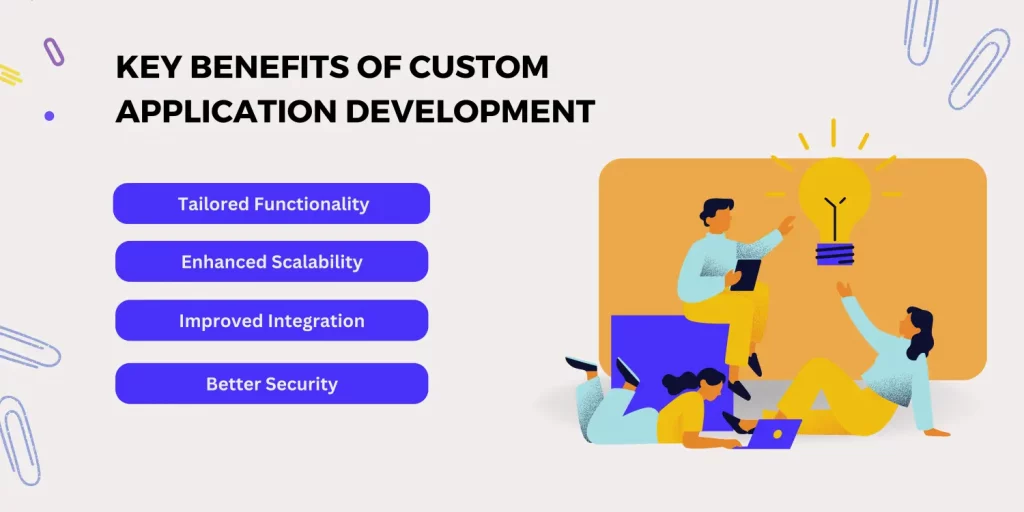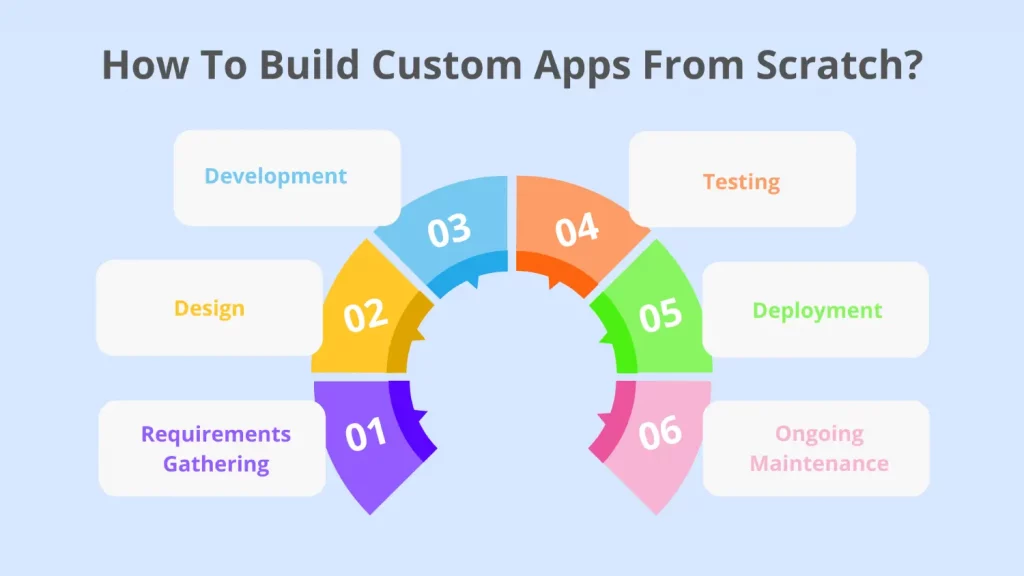Custom application development plays a vital role in the digital transformation journey of every business, startup, and enterprise. This solution offers tons of benefits, such as tailored functionality, better scalability, and enhanced security.
In the DACH regions, the application development software market is thriving. Its revenue is expected to reach $10.51 billion in 2024, with a promising annual growth rate of 5.19%.
Today, STS Software GmbH’s comprehensive guide will help you explore the ins and outs of custom app development in the DACH region. We also offer insights and key considerations to help you gain the full potential of bespoke software solutions. So, let’s check it out!
What Is Custom Application Development, And Why Is It Important?
Custom application development refers to the process of developing software apps that perform certain tasks. The apps come with unique features to meet an organization’s specific requirements.
Unlike off-the-shelf solutions, custom apps are built from scratch. Sometimes, developers customize them extensively to adapt to the unique processes and business goals. This approach helps companies control the software’s functionality, user experience, and features.
In the past, in-house software development teams were in charge of developing custom software. Yet, due to the rise of low-code development, companies can quickly build their unique apps without relying on professional coders.
Aside from low-code development, outsourcing software development is rising in the industry. Many businesses partner with a third-party company for their custom app development software. Their partners build custom apps to suit their unique needs and help their business grow.
About 90% of small businesses have converted some business operations to digital formats. Hence, the importance of custom application development becomes more impactful.
Types Of Custom Application Development
There are many types of custom app development, each catering to different functionalities and needs. The most common ones include the following:
Custom Mobile Application Development
Mobile apps work on mobile devices like smartphones or tablets. Custom mobile app development services offer tailored experiences for Android, iOS, or cross-platform systems.
Custom-made apps provide interactive UI. Users can also download them easily from app stores. Each feature of the app comes with a definite list of activities and functions to perform.
Custom Web Application Development
Users can access web apps through web browsers. They can be simple websites or complex sites like content management systems (CMS), customer relationship management (CRM), and ecommerce platforms.
Custom web apps are designed to meet specific business requirements. For example, e-commerce platforms have online transactions, payment methods, and customer support features.
Ready to launch your web application? Explore our web app development services today!
Custom Desktop Application Development
Unlike web apps, desktop apps run on a user’s computer. Thus, they don’t depend on web browsers for operations. Sometimes, users need an internet connection to access features like multiplayer gaming.
When building custom desktop apps, developers focus on offline access, complex calculations, integration with local resources, and enhanced performance.
Custom Enterprise Application Development
Enterprise apps address specific needs within large companies, such as human resource management (HRM), project management, supply chain management (SCM), and resource planning (ERP).
These apps are quite complex because they involve complicated business processes. They also have to integrate into other apps used within the company to ensure smooth operations.
Custom Cloud Application Development
Cloud-based solutions are among the hottest trends in the application development software market in the DACH region. They offer a high level of accessibility, flexibility, and scalability. Users can then easily access services and data from anywhere as long as they have an internet connection.
Custom cloud applications can be Software as a Service (SaaS) solutions or cloud-based platforms. Every cloud app should have security, automation, flexibility, and simplicity features.
Custom APIs (Application Programming Interfaces) Development
APIs enable software apps to interact with each other to exchange features, functionality, and data. They can also streamline processes and new app development by providing standardized interfaces.
Custom API development means creating APIs tailored to meet specific project or business needs. You need it when you have unique requirements and resources for API software development.
Custom Database Application Development
Data is a crucial part of every app. Custom database development gives you complete control over designing an app that can manage your data.
There are many bespoke app development solutions for databases, such as data warehousing applications and database management systems (DBMS). They can be simple forms or complex systems, depending on your requirements.
Key Benefits Of Custom Application Development

Building custom apps offers many benefits over using off-the-shelf software. Here are some reasons why custom application development is a real hit in the DACH region:
Tailored Functionality
The most significant benefit of custom app development is that the app aims to satisfy your unique needs. Thus, it fits your business perfectly, leading to increased efficiency and better user experience.
While off-the-shelf solutions may have unnecessary features or lack important functionalities, your custom-made software only includes what you need. So, you can streamline your application development process and reduce costs.
Enhanced Scalability
Developers build your apps with flexibility and scalability in mind. Hence, they can grow as your business expands to meet its increasing needs.
Moreover, custom applications offer businesses the comfort of making necessary changes. So, feel free to add new features and update your software to accommodate growth.
Improved Integration
Improved integration is one of the most notable benefits of custom application development solutions. Custom apps can integrate into your business workflow seamlessly because they aim to meet your needs. They also optimize processes and workflow productivity.
Additionally, you won’t have to worry about bugs or any issues during the integration process. The software focuses on consistency to improve efficiency and decision-making.
Better Security
Security is one of the top priorities when building software. Spending on this sector was about $6 billion in 2022, which exceeded $7.5 billion in 2023.
Off-the-shelf software is not an ideal solution for security because many users and businesses can reach it. Meanwhile, custom-made software is more difficult to hack since only authorized users can access it.
What Are The Challenges Associated With Custom Application Development?
Although tailor-made apps give you many benefits, you may also encounter a lot of challenges, such as:
Scope Creep
Scope creep happens when you make changes to your project scope. Every project starts with agreed-upon requirements. When they go beyond the contract, the project will enter scope creep.
The scope creep is terrible for any custom software development project because it may increase project cost, complexity, and duration. To solve this problem, you need to establish effective communication and project management techniques to control your project scope.
Changing Requirements
Requirements in custom app development projects may change during the development lifecycle. Like the scope creep, this issue poses challenges in terms of cost, quality, and budget.
Many custom software development companies choose Agile methodologies and effective project management solutions to deal with this problem. They enable collaboration and flexibility to evolving needs.
Resource Constraints
Your project calls for a lot of time, technologies, and budget. Limited resources will impact your project scope and delivery time.
It would be best to have a clear plan for your bespoke application development project. The plan should include proper resource management strategies. You also need to allocate your resources properly based on your project’s priorities.
Technical Complexities
Your apps may require complicated technologies, such as AI, machine learning, and integration with other systems. The more features your software has, the more complex the project.
Many businesses face the same issues. So, they look for reliable and experienced software development companies to handle the tasks. Their partners must have good problem-solving and communication skills to bring out the best performance.
Ensuring Cross-Platform Compatibility
Cross-platform compatibility is a headache for those wanting to develop an app that works on multiple platforms and devices. This task requires careful planning and testing to address potential issues. Plus, bespoke app developers must be proficient in using different frameworks and programming languages to ensure the best outcome.
What Are The Differences Between Custom Application Development vs. Off-the-shelf Software? What Should I Choose?
Off-the-shelf software is a pre-made software solution designed to fit the needs of a huge audience base. Anyone who buys the package can use it. The main advantages of this method are its cost-effectiveness and immediacy.
Off-the-shelf solutions are quick to deliver. Yet, they have limited customization and scalability. On the other hand, custom software provides tailored solutions that meet specific needs perfectly. However, they call for more investment. Let’s check the comparison below before digging into the differences between these two models:
| Off-The-Shelf Software | Custom Software | |
| Budget | Lower initial cost | Higher upfront but long-term savings |
| Timeline | Immediately available | Longer development time |
| Scalability | Highly scalable | Limited scalability |
| Flexibility | Highly flexible | Limited flexibility because of the pre-made features |
| Specific Business Requirements | Tailored to specific needs | General, may require further customization |
Budget
Off-the-shelf software involves lower investment costs because everything is ready for purchase. However, you have to deal with ownership costs and license fees.
On the other hand, custom software development is more expensive at first because of the extensive design and development processes. However, this solution helps you save costs in the long run thanks to its efficiency and scalability.
Timeline
You don’t have to work too much on the off-the-shelf solution. You can start using the product as soon as you purchase it without having to develop every feature. Thus, this option is perfect for businesses with urgent needs.
On the contrary, a custom app development project involves many steps, from designing to testing. You need several weeks or even months to build an app from scratch.
Scalability
Off-the-shelf software serves general needs. Hence, it’s not easy to adapt to changing requirements. If you want to upgrade your software, you must invest in licenses or extra modules.
In contrast, custom applications are tailored to grow with your company’s needs over time. You can add new features or increase databases without sacrificing performance.
Flexibility
Off-the-shelf software is not suitable for extensive development. Its pre-built features aim to serve a broad range of users. So, if you need a high degree of flexibility, go for custom software development. Then, you will have full control over your app’s design and features.
Specific Business Requirements
Off-the-shelf solutions can address some basic needs. Meanwhile, custom application development is ideal for specific business requirements. You can use it to address unique challenges in your industry and gain a competitive edge.
What Technologies And Programming Languages Are Commonly Used In Custom Application Development?
Since you can develop your own app with custom software development solutions, you can choose technology stacks for it, too. Some of the most popular options are:
Frontend Languages
JavaScript is a nice choice for developing interactive features. 98.9% of websites use JavaScript, making it the most popular programming language worldwide. There are also many libraries and frameworks for it, such as Vue.js, Angular, and React.
Backend Languages
Backend development includes frameworks and programming languages to develop the server-side elements of an app. The most common choices here are Java, Python, Ruby on Rails, C#, and Node.js.
Each programming language requires a different framework. For example, if you choose Python, go for Flask or Django. Both frameworks offer a simple and flexible structure for building apps.
Databases
You need to select and configure a DBMS to manage your apps‘ data. You can choose between NoSQL (like Redis and MongoDB) and SQL (like MySQL and PostgreSQL). NoSQL is suitable for apps with scalability requirements and huge amounts of data. Meanwhile, SQL works best for apps needing complex queries and robust data integrity.
Cloud Platforms
Cloud platforms provide flexibility and scalability for custom software application development. AWS, Google Cloud Platform, and Azure are the most common choices.
Advanced Technologies
Custom apps now have intelligent features, such as image recognition and natural language processing. They are products of AI and machine learning.
The Internet of Things (IoT) is widespread in custom app development, too. It involves developing apps that allow internet-based data transmission and interaction between units. These features are essential for real-time monitoring and data analysis.
The next powerful solution to try is blockchain. Developers use it to create transparent and secure systems for data sharing and transactions.
Augmented Reality (AR) and Virtual Reality (VR) are other outstanding technologies for custom application development. They establish immersive settings that keep users engaged.
How To Build Custom Apps From Scratch?

Building an app from scratch involves several steps, from gathering requirements to maintaining the product. Here is a detailed instruction for a custom application development project:
Requirements Gathering
Every custom app development project starts with requirement gathering. So first, you need to learn the project’s needs and objectives by discussing them with stakeholders. You can perform this step through surveys or interviews.
After research, define requirements for the app by planning the app’s core features. Each feature adds to the project’s timeline and cost. So, think carefully about what your app needs to achieve its goals. Based on them, you can choose the right technology stack and app development methodologies for your project.
Design
The app design affects how users interact with your app. It should have a user-friendly and attractive interface.
You need to sketch a wireframe to picture the app in your mind first. This step doesn’t call for complicated graphic design, as you can just draw the wireframe on paper or whiteboard. The key is to illustrate your app’s core features.
Then, plan the user journey. You need to expect what will happen once users click on every button on the screen.
Once the wireframe is completed, you can create a mockup for your app. It’s a more detailed outline of the app with a basic layout, a color scheme, images, and typography. Do it correctly because the development team needs it to learn how the app looks and operates.
Development
This important step involves frontend and backend development. Frontend refers to the appearance of the app, which users see. Meanwhile, the backend decides how your app operates, which is invisible to users. You need to combine the two processes when developing a custom app.
It would be best to code in a test setting. The test environment includes frontend settings, network, database server, and operation system. This way, you can easily check your app’s execution.
Testing
After developing the app, test it to ensure it’s bug-free. Your tests include:
- Device compatibility: You need to test your app on the operating system it’s supposed to support. Also, check if your app display can fit the screen size of specific devices.
- Frontend and backend functionality: Does your app look like what you pictured it to be? Can it function correctly? Ask these questions to ensure you have done the development stage properly.
- Application integration: Check if your app can interact with other features and apps, such as the camera and Google Maps.
- Security: Ensure your code is secure. You can perform penetration testing for this step.
Deployment
Now, it’s time to publish your app to the app store. There are various regulations to follow depending on the app store you choose.
Generally, developers focus on the Apple App Store or Google Play Store. If you choose a single platform, the application development process will be simpler as you just need to develop one app. However, it may limit your app’s reach. That’s why more developers like to build cross-platform apps for enhanced visibility.
Once your application is live, gather feedback to make necessary adjustments. You can check reviews or analytics to identify room for improvement.
Ongoing Maintenance
User needs keep changing. Thus, you have to keep updated with the hottest trends in the industry to remain competitive. You can add new features to make your app stand out.
Moreover, regular maintenance helps solve bugs to project your app. Regular updates ensure the app is still compatible with its operating system and follows industry standards.
How Much Does It Cost To Build A Custom Application?
Developing a custom app costs from $10,000 to $400,000. This wide range comes from multiple factors, such as:
Cooperation Model
You can choose from software development outsourcing or in-house development. Generally, outsourcing is a more cost-effective solution.
If you build an in-house team to work on your software development project, you have to spend money on hiring, training, and managing your employees. You also need to invest in IT infrastructure for them.
On the other hand, you can choose custom app development services from a third-party company to cut down the costs. Your partner has the expertise and experience in delivering top-notch services within the budget.
You can even minimize your initial investment if you outsource to a country with a low labor cost. Offshore software development services are popular for their cost-effectiveness and high-quality.
Application Requirements
The complexity and scope of your app’s requirements affect the development cost. Apps with basic features cost less to develop than feature-rich ones.
You may also want a creative design for your app, but it’s surely more expensive. Expect the increased cost if you add interactive elements to make it look lively.
Integration is another issue. For example, if you develop an ecommerce app, you need it to link to payment providers, such as Authorize or PayPal. The integration with other systems will cost more money.
Development Team Size And Composition
The size and composition of the development team impact the bespoke software application development cost, too. Large teams come with higher costs. Moreover, hiring experienced developers with specialized skill sets requires higher salaries. But, of course, they result in higher-quality outcomes.
Technology Stack
The technology stack used to develop your custom app is another factor to consider. Some technologies demand higher licensing fees and expertise, leading to higher development costs.
Ongoing Maintenance
You need ongoing maintenance to optimize the performance of your app. Costs related to bug fixes and updates are necessary.
Maintenance costs vary depending on various factors, such as the app’s complexity and frequency of updates. You need a maintenance plan to manage these ongoing costs effectively.
How Can Custom Applications Be Tailored To Specific Industries Or Niches?
Custom apps can be customized to meet the unique needs of different industries, such as finance, healthcare, ecommerce, and manufacturing. Let’s look at these two case studies to see how STS Software GmbH, an experienced software development company, has done the trick!
Case Studies 1: MeetDoris
MeetDoris needed a web-based tool to enhance time management and productivity. They also hope their users can control their payments and preferences.
So, STS Software GmbH tailored the app to UK preferences to boost client interaction expertise. Our application developers also prioritized tasks within projects and syncs with user’s calendars via APIs.
Morevero, our company respected client requirements. We emphasized an even calendar and global rescheduling settings. This approach ensures smooth operations that meet clients‘ specifications.
Case Studies 2: Luxasia
Luxasia is a leading omni-channel in Singapore. The company wanted a mobile app for seamless staff communication. They also required real-time data updates to ensure accurate information.
To satisfy client needs, STS Software GmbH held meetings, performed regular evaluations, and used state-of-the-art technologies. Understanding that this project required multiple methodologies, we worked hard to pick up the most suitable technology stacks and ensured future scalability. Our effort guaranteed a high-quality app that met Luxasia’s specific needs while maintaining the product value.
How Can Businesses Find The Right Custom Application Development Partner?
Choosing the right custom application development partner is the first step to success. Here are some tips to help you select the ideal companion for your next project:
- Experience: Look for companies with a proven track record of experience in custom application development. It would be perfect if they had worked in your industry.
- Expertise: Assess the application developers‘ expertise in relevant technologies, frameworks, and programming languages needed for your project.
- Portfolio: Check the partner’s portfolio to view their past projects and gauge the quality of their work. Remember to find examples of projects similar to yours.
- Client testimonials: You can also learn about your partner by reading client testimonials to get feedback on their performance.
- Communication skills: Communication is important for custom app development projects. So, evaluate your partner’s communication skills and responsiveness.
- Pricing structure: Compare the pricing structures of potential partners to ensure they align with your budget and project requirements.
Why Choose STS Software GmbH For Your Custom Application Development Projects?
STS Software GmbH is proud to be a dedicated custom application development company. Choose us, and you will gain the following advantages:
- We have more than ten years of experience to ensure high-quality solutions tailored to your needs.
- STS Software GmbH offer cost-effective solutions to cut down your custom app development cost without sacrificing quality, benefiting many businesses and startups in Switzerland and Germany.
- You can choose from different models, such as project-based models, dedicated development teams, IT staff augmentation, and time-material contracts.
- We have over 250 IT professionals, custom app developers, software engineers, QA testers, and data analysts committed to your success.
- You can benefit from our expertise across different industries, including healthcare, finance, ecommerce, manufacturing, retail and more.
- Security is not a problem as we perform various security measures for your needs, such as data encryption, authorization, regular audits, secure coding practices, and compliance with industry standards (like HIPAA and GDPR).
- Our ISO certifications ensure that we adhere to international standards in our development processes.
- We use NDA (Non-Disclosure Agreement) to protect your confidential information.




